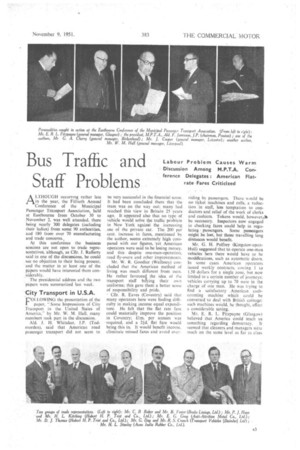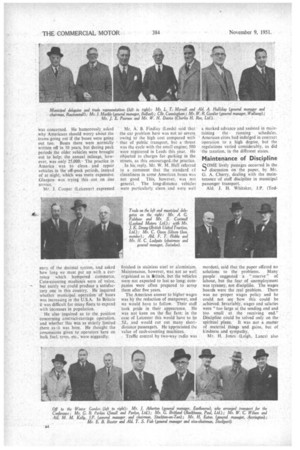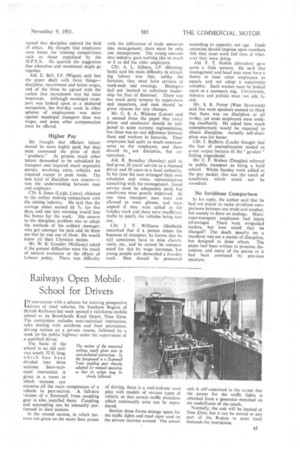Bus Traffic and Staff Problems
Page 37

Page 38

Page 39

If you've noticed an error in this article please click here to report it so we can fix it.
Labour Problem Causes Warm Discussion Among M.P.T.A. Conference Delegates : American Flatrate Fares Criticized
ALTHOUGH occurring rather late in the year, the Fiftieth Annual Conference of the Municipal Passenger Transport Association, held at Eastbourne from October 30 to November 2, was well attended, there being nearly 300 delegates (including their ladies) from some 90 authorities, and 180 from over 70 manufacturing and trade ecincerns„ At this conference the business sessions are not open to trade representatives, although, as Cllr. J. Rafferty said in one of the discussions, he could see no objection to their being present, and the matter in at least one of the papers would have interested them considerably.
"Yhe presidential address and the two " papers were summarized last week.
'City Transport in U.S.A.
FOLLOWING the presentation of the paper. "Some Impressions of City Transport in the United States of America,' by Mr. W. M. Hall, many members took part in the discussion.
Aid. J. H. Whitaker, J.P. (Todrnorden), said that American road passenger transport did not seem to be very successful in the financial sense. It had been concluded there that the tram was on the way out; many had reached this view in Britain 25 years ago. It appeared also that no type of vehicle would solve the traffic problem in New York against the increasing use of the private car. The 200 per cent. increase in fares, rnentieuted by the author, seems extremely high compared with our figures, :yet American operators were said tube losing money, and this despite one-man-operation, road fly-overs and other improvements.
Mr. W. R. Goodicr (Wallasey) concluded that the American method of living was much different from ours, He rather favoured the idea of the transport staff biTyMg their own uniforms; this gave them a better sense of responsibility and pride. Cllr. R. Eaves (Coventry) said that many operators here were finding difficulty in making income equal expenditure'. He felt that the flat rate fare could materially improve the position in Coventry; V m. per annum was • required, and a 21d. flat fare would bring this in. It would benefit income, eliminate missed fares and avoid over riding by passengers. There ■,VOLI d be no ticket machines and rolls; a reduction in staff, less temptation to conclUctors and relief of the work of clerks and cashiers. Tokens would, however,* be necessary. Inspectors now engaged in checking fares could help in regulating passengers. Some passengers might be last, but those travelling long distances would benefit
Mr. G. H. Pulfrey (Kingston-uponHull) suggested that to operate one-man vehicles here there would have to be modifications, such as automatic doors. In sonic eases American operators issued weekly contracts, costing I to 1.50 dollars for a single zone, but now limited to a certain number of journeys; vehicles carrying up to 70 were in the charge of one man. He was trying to find a satisfactory American cashcounting machine which could be converted to deal, with British coinage: such machines would, he thought, effect a considerable saying.
Mr. E. R. L. fitzpayne (Glasgow) believed that America could teach us something regarding democracy. It seemed that cleaners and managers were much on the same level as far as class
was concerned. He humorously asked why Americans should worry about the trams going out if the buses were going out too. Buses there were normally written off in 10 years, but during peak periods the older vehicles were brought out to help; the annual mileage, however, was only 25.000:The practice in America was to clean and repair vehicles in the off-peak periods, instead of at night, which was more expensive: Glasgow was trying this out on one service.
Mr. J. Cooper (Leicester) expressed
envy of the decimal system, and asked , how long we must put up with a currency which hampered commerce. Coin-counting machine's were of value, but surely we could produce a satisfactory one in this country. He inquired whether municipal operation of buses was increasing in the U.S.A. In Britain it was difficult for many fleets to expand with increases in population.
He also inquired as to the position concerning contract-carriage operation, and whether this was as strictly limited there as7it was here. He thought the concessions given to operators here on bulk fuel. tyres. etc., were niggardly. Mr. A. B. Findlay (Leeds) said that the car problem here was not so severe owing to the high cost compared with that of public transport, but a threat was the cycle with the small engine; 500 were registered in Leeds this year. He objected to charges for parking in the streets, as this encouraged—the practice.
In his reply. Mr. W. M. 1-Jail referred to a comment that the standard cf cleanliness in some American buses was not good. This however, was not general. The long-distance vehicles were particularly clean and were well
finished in stainless steel or aluminium. Maintenance, however, was not so well organized as in Britain, but the vehicles were not expected to last so long; companies were often prepared to scrap them after five years.
The American answer to higher wages was by the reduction of manpower, and we would have to follow. Their staff took pride in their appearance. He was not keen on the flat fare; in the case of Leicester this would have to be 5d., and would cut out many shortdistance passengers. He hppreciated the value of cash-counting machines.
Traffic control by two-way radio was a marked advance and assisted in main taining the running schedules. American cities had indulged in contract operation to a high degree, but the regulations varied considerably, as did -the taxation, in• the different states.
Maintenance of Discipline QOME lively passages occurred in the.
discussion on the paper, by Mr. G. A. Cherry, dealing with the maintenance of staff discipline in municipal passenger transport.
Ald. J. H. Whitaker, J.P. (Tod
morden), said that the paper offered no solutions to the problems. Many people suggested a " reserve " of labour, but the fear of unemployment was tyranny, not discipliffe. The wages boards were the real problem. There was no proper wages policy and he could not see how this could be achieved. Invariably, wages and salaries were "too large at the sending end and too small at the receiving end." Discipline could be solved only on the spiritual plane. It was not a matter of material things and gains, but of kindness and sympathy.
Mr. H. Jones (Leigh, Lancs) also
agreed that discipline entered the field of ethics. He thought that employees were better for winning competitions such as those organized by the M,P.T.A. He queried the suggestion that education and resentment might go together.
Ald. E, Ball, J.P. (Wigan), said that the paper dealt with three things— discipline, recruitment and better wages, and of the three he agreed with the author that recruitment was the most important. Although municipal transport was looked upon as a sheltered occupation, the five-day week in other spheres of employment was more against municipal transport than was wages, and some other compensation must be offered.
Higher Pay
He thought that efficient labour should be more highly paid, but they must command the price of their "products." At present much other labour demanded to be subsidized by transport and required much expensive service, involving extra. vehicles not .required except at peak loads. The best kind of discipline was unseen—it was the understanding between man and employer.
Cult. S. Jones (Leigh, Lanes), objected to the author makinig comparison with the mining industry. He said that the average miner earned £6 7s. for five days, and one late morning would lose his bonus for the week. His answer to the discipline problem was to adopt the methods of the colliery manager, who got amongst his men and let them see that he was one of them. He would know all their Christian names.
Mr. W. R: Goodier (Wallasey) asked if the present difficulties were the result of natural evolution or the effects of Labour policy. There was difficulty with the infiltration of trade unionism into management; there must be only one management. The young entrants into industry gave nothing like so much to it as did the older employees.
Cllr. A. L. Gibson, J.P. (Birmingham), said the main difficulty in attracting labour was that, unlike the factories, they must have services at week-ends and evenings. Managers had not learned to substitute leadership for fear of dismissal. There was too much petty tyranny by supervisors and inspectors, and men should be given reasons for any changes.
Mr. C, S. A. Wickens (Luton) said it seemed from the paper that every driver and conductor should be subjected to some extreme regimentation, but there was no real difference between them and workers in factories. Their employees had quite as much -commonsense as the employers, and there should be4 not discipline, but cooperation.
Aid. R. Broadley (Burnley) said he had given 20 years' service as a licensed driver and 30 years to a local authority. In his time the men arranged their own schedules and rotas, representatives consulting with the management. Good service must be adequately paid, but conditions were greatly improved. At one time transport men were not allowed to wear glasses, and were unpaid if they were called in for holiday work and there were insufficient traffic to justify the vehicles being sent out.
Cilr. J. F. Williams (Sheffield) remarked that if a person enters the business of transport, he knows that he will sometimes have to miss church, visits, etc., and he cannot be compensated for this by wage increases, but young people now demanded a five-day week. Men should be promoted according to capacity, not age. Trade unionists should impress upon members thit they Must work full time at whatever they were doing.
Aid. F. T. Hobbs (Swindon) gave quite a little sermon. He said that management and head men must have a desire to treat other employees as equals, and not adopt a superiority complex. Each worker must be looked upon as a necessary cog. Christianity, industry and politics must run side by side.
Mr. S. R. Potter (West Bromwich) said that most speakers seemed to think that there was no discipline at all to-day, yet most employees were working excellently. He asked how much unemployment would be required to obtain discipline. Actually self-discipline was far better.
Cite. J. Rafferty (Leeds) thought that the fear of unemployment tended to arrest output because of the " go-slow" feeling engendered.
Mr. C. F. Wolsey (Douglas) referred to public transport as being a hard school. Whilst Sunday work added to the pay packet, this was the result of conditions which could not be remedied.
No Invidious Comparison In his reply, the author said that he had not meant to make invidious comparisons between one trade and another, but merely to draw an analogy. Municipal-transport employees had many advantages. There were ' misguided leaders, but how could they be changed? The death penalty on a murderer was not a matter of discipline, but designed to deter others. The paper had been written to promote discussion, and many of the points in it had been answered by previous speakers.




















































































